| Srl | Item |
| 1 |
ID:
173782
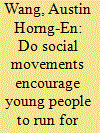

|
|
|
|
|
| Summary/Abstract |
The 2014 Sunflower Movement led to rising political participation among young Taiwanese. Hence, opposition parties and civic groups created programs to support young candidates running in the village chief elections. Compared with the 2010 election, however, fewer young challengers ran in 2014, and they received fewer votes and won fewer seats. Propensity score matching shows that the presence of young candidates on ballots did not increase turnout. However, young candidates affected the election indirectly: young, new candidates attracted more votes from incumbents than from challengers and therefore decreased the incumbent re-election rate.
|
|
|
|
|
|
|
|
|
|
|
|
|
|
|
|
| 2 |
ID:
161403
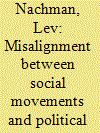

|
|
|
|
|
| Summary/Abstract |
Why would opposition movement activists not support an established opposition political party? Taiwan’s 2016 presidential election is apropos. This study shows that the Democratic Progressive Party lost support from leftist activists not only because of ideological distance but because they see the party as flawed and ineffective. But activists still voted strategically for Tsai Ing-wen and the DPP to thwart the Nationalist Party from winning the election.
|
|
|
|
|
|
|
|
|
|
|
|
|
|
|
|
| 3 |
ID:
152270
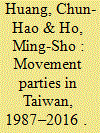

|
|
|
|
|
| Summary/Abstract |
This article examines the development of “movement parties” in Taiwan by applying the political opportunity perspective to understand how external conditions impacted their electoral path. We explain the rise and fall of movement parties by changes in electoral system, level of movement activism, and the permeability of the DPP.
|
|
|
|
|
|
|
|
|
|
|
|
|
|
|
|
| 4 |
ID:
137207
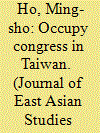

|
|
|
|
|
| Summary/Abstract |
In opposition to a free trade pact with China, Taiwan's Sunflower Movement erupted in spring 2014 and occupied the national legislature for twenty-four days. Drawing from the recent debates on the relation between social movements and the state, I elaborate a revised polity model that focuses on the effects of elite disunity, threat, and movement strategy. The Sunflower Movement originated from a tactical misstep by the ruling party that created an immediate sense of threat from proposed closer economic ties with China, thereby facilitating protest mobilization. Student protesters were able to seize the national legislature because of an internal split within the ruling party and support from the opposition party. However, the failure to further exploit these favorable opportunities exposed the movement to government repression. Fortunately for the movement, the disunity among elites helped the activists manage a dignified exit, which they could claim as a success.
|
|
|
|
|
|
|
|
|
|
|
|
|
|
|
|
| 5 |
ID:
172649
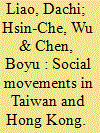

|
|
|
|
|
| Summary/Abstract |
We propose the logic of communitive action to analyze digitally networked social movements. Through an examination of Taiwan’s Sunflower Movement and Hong Kong’s Umbrella Movement, we offer an explanatory framework of community consciousness that elucidates a new type of leadership, and discuss crowdsourcing as a supplement to the theory of social movements in the digital age.
|
|
|
|
|
|
|
|
|
|
|
|
|
|
|
|
| 6 |
ID:
157196
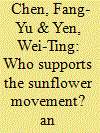

|
|
|
|
|
| Summary/Abstract |
The Sunflower Movement—an occupation of the Legislative Yuan (the Congress) for 24 days—was an unprecedented moment in the history of Taiwan. We examine the social foundation of the Movement and explore an important factor that has long been missing in the literature of Taiwanese politics: nationalism. We divide nationalism into three dimensions: national attachment, national chauvinism, and feelings toward other countries. Using original survey data collected six months after the Movement, we find that national attachment (being proud of Taiwan) and anti-China feelings are unique dimensions and both lead to a higher level of support for the Sunflower Movement. National chauvinism, on the other hand, is not associated with supports for the Movement. Furthermore, the impact of nationalism is contingent on sociotropic views. People who express higher levels of nationalism are more responsive to the issue of rising income inequality when evaluating the Movement. The underlying logic is when people are more nationalistic they care more about the potential social impact of expanding socio-economic exchanges with another country. These results point to it being necessary to disentangle various components of nationalism and further investigate their effects on individuals’ political behaviors.
|
|
|
|
|
|
|
|
|
|
|
|
|
|
|
|
| 7 |
ID:
170373
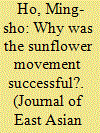

|
|
|
| 8 |
ID:
138567
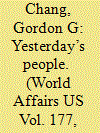

|
|
|
|
|
| Summary/Abstract |
Only a few dozen protesters gathered to jeer Chen Deming, China’s point man on cross-strait relations, as he flew into Taiwan in December. Previously, violence and headline-grabbing incidents had marred the visits of high-ranking Beijing officials to the self-governing island, but for the most part this eight-day trip was uneventful.
|
|
|
|
|
|
|
|
|
|
|
|
|
|
|
|